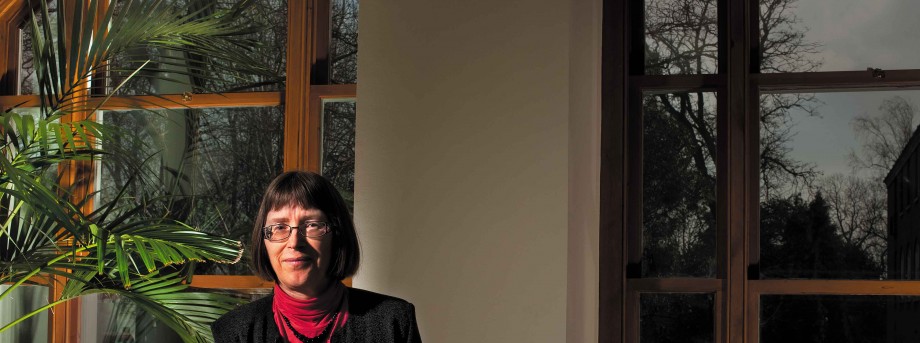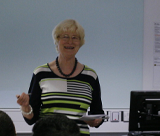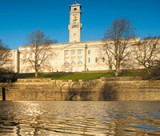
Profile: Professor Brigitte Nerlich
March 11th, 2013
Tell me a bit about yourself?
“I’m Professor of Science, Language and Society. My title feels very general — I’m to blame, I wrote it myself. But I do sometimes wish I was a Professor of Quantum Mechanics or something — because that would tell you exactly what I do!”
Do you have a typical day?
I wake up in the morning, look at Twitter, have a coffee…I don’t really have a typical day. I do some teaching, but not much compared to other research colleagues. I do lead the Emerging Technologies and Society course within Sociology, but this is team taught so my teaching hours vary throughout the year. I also contribute to various other courses across different faculties — for example every year I go and talk to the bioscientists at Sutton Bonington on the public perception of food risk. And I give lectures in the Nottingham Nanotechnology and Nanoscience Centre on the social impact of nanoscience.
What drew you to this area of research?
Brigitte was part of the Department of Linguistics which closed in 1989. She then moved into Psychology, lectured on the history of semantics and pragmatics, while also tutoring in French.
She was asked to be part of a Leverhulme programme grant application that examined public perception of risk – this became the Institute of Science and Society. In 2009 the Institute was integrated into the School of Sociology and Social Policy. Brigitte was made Professor in 2007. She’s now programme director for ‘Making Science Public’, a five-year Leverhulme-funded programme, looking at language used by media, policy makers – what rhetorical tools they use.
“My core identity is metaphor analysis,” she says. “I had to become interested in science. Before, I was an arty-farty person, science wasn’t something I looked at at all. Arts was my focus, now it’s not.”
How does your work impact on the man/woman in the street?
“My work is all about how ‘ordinary’ people read and digest scientific language, and how language is used to shape their perceptions and understanding of complex subjects. It affects the way they view the world.”
What would you hope your research will achieve?
“I hope my work will be read by people who find it interesting. I try to write in such a way that people can interact with my research. I want them to be able to take something from it.”
What advice would you give to you young research students?
“Find something that you’re passionate about. Don’t just do your work because it has to be done, do it because you really want to. There has to be a spark.”
She recognises that students today are faced with a financial angle to their educational choice that she didn’t have to consider. “But don’t let this drown out the spark. Students today must answer the question, ‘How do I balance out the enjoyment issue with the financial issue.’”
“I never thought of getting a job. I did the stuff I was passionate about and the job came later. Take any opportunities you can to do something new — don’t just go through life on one road, branch out and explore if you can.”
What living person do you most admire and why?
“One of the people I most admire at the moment is Athene Donald, Professor of Soft Matter and Biological Physics at Cambridge. She blogs about women in science and I follow her on Twitter. She does a lot of outreach and engagement work and is on committees for various societies. When I read her blogs I think, how does she do it? Put things so clearly and eloquently? Where does she find the time?”
If you weren’t doing this what else would you be doing?
“At one point I thought about setting up a company to rewrite academic texts… Other than that, I would probably be a teacher, but not a very happy one.”
Where do you call home?
Home is Wollaton, not Germany – particularly from a work perspective. “German academia is very rigid, hierarchical and stuffy.”
If you could go back in time where would you go and why?
“I would go back to the 1830s, anywhere near Darwin’s house. That is my time. What was happening across science and society was so exciting.”
How do you relax?
“My husband says I don’t…”
Brigitte enjoys walking, gardening, taking photographs and “reading crappy books” — chick lit and crime novels interspersed with the classics “to make me feel better”. But she also reads Dickens and Austin: “for the beautiful language.”
Tags: Athene Donald, Brigitte Nerlich, Emerging Technologies and Society, Nottingham Nanotechnology and Nanoscience Centre, Professor of Science Language and Society, Professor of Soft Matter and Biological Physics
Leave a Reply
Other People profiles

Dr. Christine Humfrey, 1947-2020
The University is saddened to hear of the recent death of Dr Christine Humfrey, the founding […]

New appointments at The University of Nottingham International College
The University of Nottingham International College has appointed its inaugural College Director. Diane Dale will take […]

